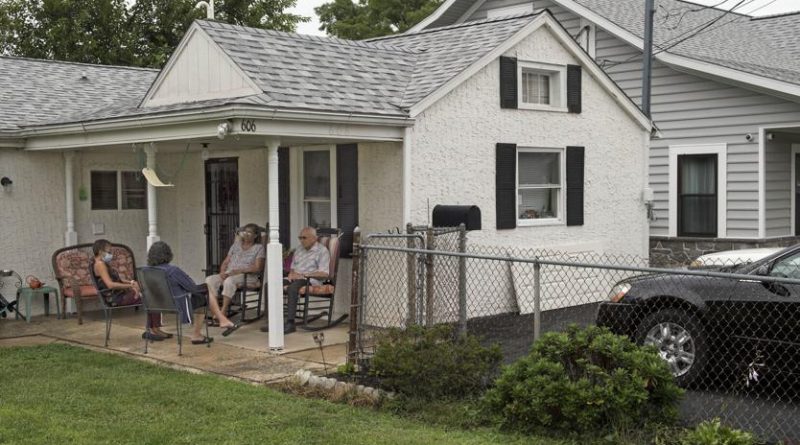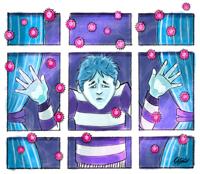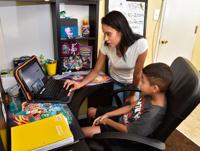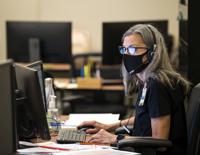How COVID-19 upended the lives of two local families | Local News
Family is important to Artemio Sr. and Ada Perales. The same can be said of Orlando and Nidia González.
Both couples have big families who like to spend lots of time together.
Whether hosting family dinners or just spending time chatting on the porches of their Lancaster County homes, their daily routines tended to include visits from their children and grandchildren.
Then everything changed.
On March 18, Lancaster General Hospital reported someone tested positive for COVID-19. Ten days later, someone died from the virus.
Both were firsts in the county, which since then has seen more than 7,000 people test positive and over 400 die from the coronavirus.
Six months later, there are no signs of when the devastating virus will subside.
Sanitizing stations, floor decals and Plexiglas dividers might go away at some point, but for some people, their close encounter with COVID-19 and its ripple effects will leave a lasting mark.
For the Perales and González families, the virus hit close to home, disrupting their lives in ways they never expected.
While plenty of challenges lie ahead, they remain vigilant and are finding ways to bounce back from their experience. Here are their stories.
The Perales family
Artemio Sr., 84, and his wife, Ada, 79, have four children, 12 grandchildren and 11 great-grandchildren.
They’ve always vacationed together, and most Saturdays were spent at Artemio and Ada’s Lancaster city home, with Ada cooking a meal for everyone.
“My parents’ house is the house that we hung out all the time,” daughter Milagros Perales Saldaña, 50, said. “We didn’t need a special reason. We are just always together, whether at my parents’ or at one of the children’s houses. But we didn’t do any of that this year.”
Saldaña became concerned one day in March when her father was not feeling well.
“I took him to the hospital right away to be checked,” Saldaña, a registered nurse at Wellspan Ephrata Community Hospital, said.
He was treated for dehydration and was sent home.
On March 28, he returned to Lancaster General Hospital after experiencing shortness of breath, and an examination revealed changes in the condition of his lungs.
Artemio Perales tested positive for COVID-19.
He was among the first Lancaster County residents to test positive for the coronavirus.
His wife and Saldaña also would go on to contract COVID-19.
While her mother’s symptoms were mild enough to allow her to recover at home, Saldaña was hospitalized at LGH for six days.
That was a game changer for the Perales family.
“I was very scared because my family is always here, and I didn’t want them to get the virus, too,” Ada Perales said.
Stress and anxiety
Artemio Perales doesn’t remember much of the 23 days he spent in the hospital, nine of which were spent hooked up to a ventilator. He slipped into a comatose state.
“At the time we were not required to wear masks,” Saldaña said. “We had spent hours in the hospital room with him breathing the same air … everyone was exposed.”
As he recovered, he was transferred to Lancaster Rehabilitation Hospital in East Hempfield Township for a week of physical and occupational therapy.
“I don’t remember much of it,” he said. “I still get tired and very forgetful.”
The stress and anxiety the family experienced reached a new level as they dealt with the situation, daughter Maribeth Perales Paisley said.
“People have no idea of what it’s like to get a call from the hospital telling you that your father might not make it through the night, that there’s nothing more they can do for him, that he wants no resuscitation, to start gathering your family,” Paisley, 57, said. “ … Then to think about what could happen to my mom and my sister.
“But faith and prayer kept us together and gave us peace,” she said.
‘A walking miracle’
Artemio Perales continues to recover at home with the help of his family. On any given day he can be found sitting on his front porch with his wife.
He said the most difficult part of his recovery is being tired all the time.
“But most of all I miss visiting friends and people from church,” he said.
Prior to testing positive for the coronavirus, Artemio Perales, who serves as a deacon at First Spanish Assembly of God, enjoyed visiting church members who were homebound or hospitalized. Ada Perales taught a Bible class at the church.
“I’m a walking miracle,” Artemio Perales, who jokingly calls himself “Lazarus,” said. “Until you go through what we’ve had, you have no idea of what this virus can do to you.”
Saldaña still struggles with some side effects, particularly her concentration.
“I have to write down everything that I normally would do without problem,” she said. “It’s getting better, but not fast enough.”
The family has missed numerous milestone celebrations, but they are fine with that.
“People need to listen to the recommendations of the experts and wear a mask. Otherwise we put everyone else’s life at risk,” Ada Perales said.
That’s still a concern for the Perales family, who have opted to do virtual meetings to stay in touch.
They also share a new outlook on life.
“We don’t know how long this pandemic is going to last. We know we might not be able to gather for a long time,” Saldaña said. “This experience made us more aware of our mortality, made us think about what’s going to happen to us beyond this moment and this life.
“The biggest takeaway is that it’s made us closer and has also turned our faith into a stabilizing force in our lives.”
The González family
Orlando González never downplayed the seriousness of the coronavirus.
The 63-year-old Manheim Township resident heeded the advice of health experts to protect himself and his family from the virus.
“Mostly because we have grandchildren around us all the time and I wanted to make sure they were all safe,” González said.
A painter with Quality Custom Cabinetry in New Holland, González always tried to get away from the day-to-day distractions by spending time with his wife, Nidia, 61, their two adult children, seven grandchildren and extended family as often as possible.
They enjoyed getting together after church on Sundays for an afternoon meal, going on walks around their neighborhood and visiting relatives in New Jersey.
“We are very spontaneous about it,” daughter Michelle Ramos, 37, said. “We could just be driving by each other’s house and we stop by and make an experience out of that moment.”
All of that changed on an early May morning when a slight body ache woke her father up from his sleep.
‘Fear quickly settled in’
“I began to feel muscular pain and what appeared to be the regular symptoms of a cold,” González said.
He tried not to pay it much attention but couldn’t ignore it, he said. A week earlier, he recalled, a person working near him at a local food bank where he volunteered had tested positive for COVID-19.
González told his wife and they came up with an action plan.
“I went to sleep in a room in the basement of our house and she stayed in our bedroom,” González said. “We called our doctor and asked to be tested for COVID.”
In the meantime, positive cases continued to rise in the county along with the number of people dying from the coronavirus.
“Everywhere we looked on television and on the internet, there (was) news about the virus and how people were getting sick and dying from it,” Nidia González, a dual paraeducator with School District of Lancaster, said. “So fear quickly settled in.”
Their fears were confirmed when Orlando González tested positive for COVID-19.
“I only had a high fever for a day. I had loss of smell for two days and loss of taste for two or three days during the first week,” he said. “Then I had a cough and a burning and itching sensation on my legs every night for two weeks. Breathing was almost normal but also very exhausting.
“I’m grateful that my physical symptoms were mild,” he said.
However, the experience took an emotional and psychological toll on him.
‘I couldn’t see my family’
“I was very afraid of contaminating my wife and rest of my family, especially our grandkids,” said Orlando González, who was not hospitalized as he recovered. “Being isolated from them was very difficult to deal with. We are very close, but I couldn’t be near them, I couldn’t see my family, and that really affected me emotionally.”
Meanwhile, his wife, who tested negative for the virus, had to keep up with the household daily routine but mostly kept herself in isolation as a safety precaution.
“At one point, I had to run outside to breath because I felt as if I was choking from the anxiety,” she said.
Ramos said she didn’t believe how serious things were until she saw a picture of her father appearing fragile, and there was nothing anyone could do. She said she made sure her parents stayed connected to the rest of the family through video calls and, with the help of her children and other relatives, arranged for cooked meals and food supplies to be dropped off at her parents’ home.
“In our culture, we kiss and hug as soon as you go into a room or when you see someone you know,” Ramos said. “Well, we couldn’t do it then and we still can’t do it now. This virus doesn’t discriminate. It has caused us to be more careful about ourselves and the people around us. We keep our distance.”
‘The virus is not fiction’
Going back to work after being away for four weeks proved a challenge for Orlando González.
“I was afraid of being rejected by my coworkers if they felt I could potentially infect them,” he said. “But that was not the case and it helped me ease back into the work routine.”
However, he is an unexpected effect of his bout with the coronavirus.
“There are smells that bring back memories and the sensation of the symptoms that I experienced when I had the virus,” he said. “There are certain foods that I can’t eat because they bring to mind the days I was locked down on my own … the days when I last had that type of food.”
Orlando González hasn’t stepped back into the room where he quarantined while dealing with the virus.
“I’m still dealing with those emotions,” he said.
The family gatherings have not resumed as the pandemic drags on with no end in sight, and there is no hugging or kissing.
“This is real, this virus is not fiction, and it’s serious,” he said. “We have to stop being selfish and follow the recommendations to avoid the spread. We have to think about other people. We have to protect each other.”








